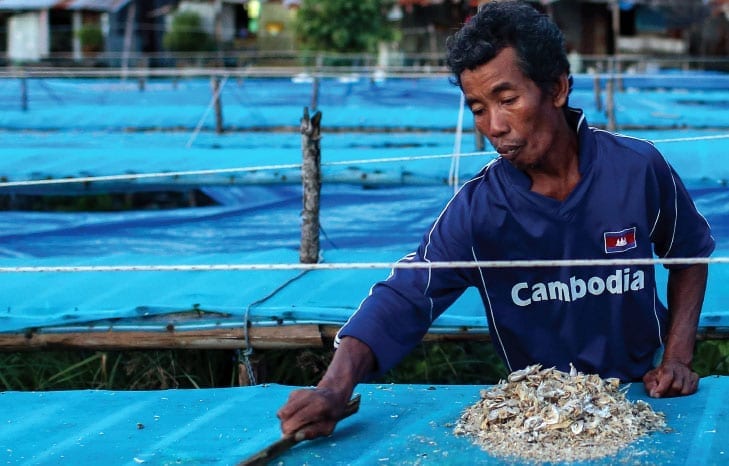
Mar 11, 2019
Suthasinee Kaewleklai, coordinator for Migrant Workers Rights Network (MWRN) in Thailand, recently was honored for her work by the National Human Rights Commission of Thailand (NHRCT).
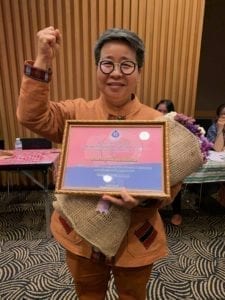
Suthasinee Kaewleklai, MWRN coordinator, recently was honored for her work by the National Human Rights Commission of Thailand (NHRCT). Credit: Solidarity Center/Robert Pajkovski
“Migrant workers are among the most vulnerable and abused workers in every country,” says Kaewleklai. “Worker rights are human rights, and migrant workers are entitled to fundamental rights without discrimination, including the freedom of association and collective bargaining. We will fight shoulder to shoulder with our sisters and brothers.”
Kaewleklai received the award during an NHRCT seminar last week, held in conjunction with International Women’s Day to honor women human rights defenders. The nonprofit MWRN, a Solidarity Center partner, has provided a crucial bridge between workers and access to legal redress for unpaid wages, occupational injuries and other forms of workplace abuse since it was founded in 2009.
“Whether they are protecting rights in the judicial process, fighting against impunity for rights violations, protecting democratic freedoms and the rights of communities and migrant workers, or fighting for freedom of expression, equality and the reduction of biases, their courageous stories are models and inspirations for future generations to learn and remember,” Angkana Neelapaijit, National Human Rights commissioner, said during the award ceremony.
Risking Physical, Verbal Assaults to Support Workers
Kaewleklai, a long-time trade unionist, began championing worker rights in the 1990s, when she worked at a factory in the Rangsit district, north of Bangkok. A co-founder of the factory’s union, she and other workers successfully challenged their employer’s refusal to regularly pay wages, and she successfully took legal action after the employer fired her and other union activists.
She later worked as coordinator for the Thai Labor Solidarity Committee, another Solidarity Center partner, and has championed the issues of working women, successfully campaigning to make International Women’s Day a national holiday.
At the MWRN, Kaewleklai advocates for the rights of migrant workers to form unions, negotiate with their employers for better working conditions, and urging lawmakers to ratify International Labor Organization standards on freedom of association and collective bargaining. She has helped migrant workers on chicken farms and elsewhere recover unpaid wages and attain safe working conditions.
She repeatedly has been verbally threatened, physically attacked and put under surveillance by state and non-state actors for her work to protect and promote labor rights and the rights of migrant workers. Currently, Kaewleklai, along with 14 migrant workers and other human rights defenders, is challenging criminal and civil charges filed by the poultry company, Thammakaset Company, following her advocacy on behalf of the company’s underpaid migrant workers.
Despite rulings by authorities and the courts against Thammakaset—including a January Supreme Court decision upholding a lower court ruling ordering Thammakaset to pay $53,600 to 14 former migrant workers for violations of the Labor Protection Act—the company continues to pursue charges against Kaewleklai and the others. Human rights defenders believe the charges are part of a strategy to harass human rights defenders and migrant worker rights advocates.
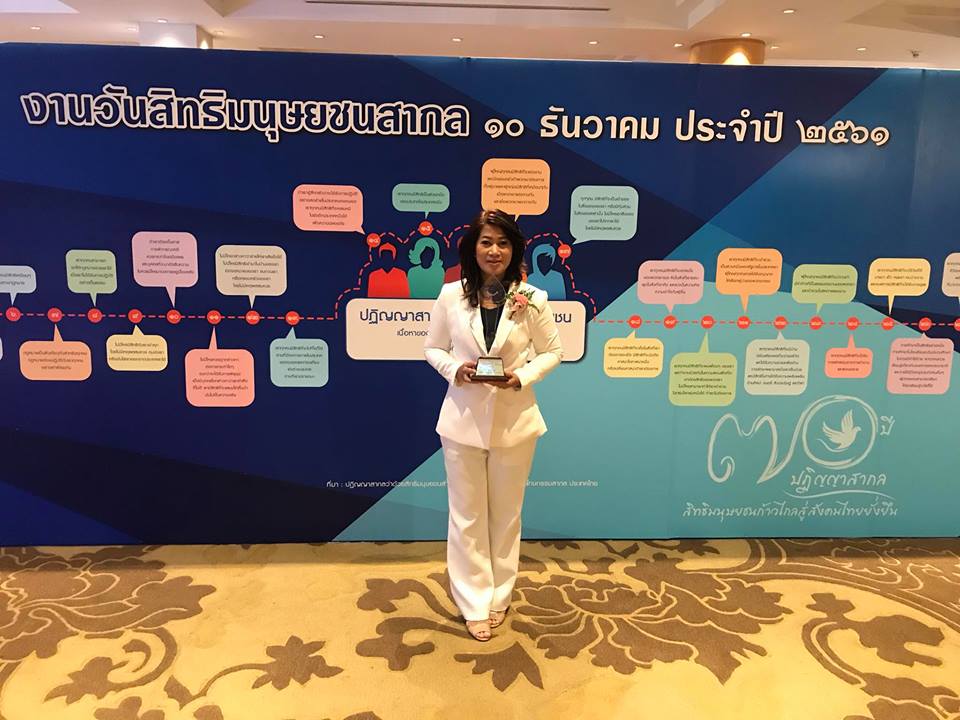
Dec 13, 2018
Worker rights advocate Apantree Charoensak, vice chair of the Thai Labor Solidarity Committee, Women’s Division, was honored this week for her work protecting and promoting human rights by Thailand’s National Human Rights Commission (NHRC).
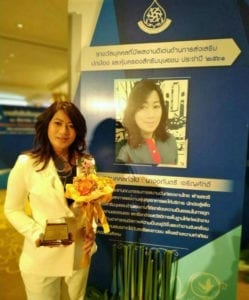
Courtesy Apantree Charoensak
Charoensak led the successful 2017 struggle for collective bargaining rights for collective bargaining rights for fast food workers at one of Thailand’s largest KFC franchises, in which 3,100 workers won a contract that includes an early retirement program, 23 meals provided by the company per year and motorcycle maintenance funds for delivery workers. The workers are among 2,400 members represented by the Cuisine and Service Workers’ Union, a Solidarity Center partner and IUF affiliate.
“I am proud to have advocated for human rights for the past seven years,” Charoensak said in a statement on the award, granted to 13 human rights defenders as part of International Human Rights Day December 10.
Charoensak has been leading the struggle for fast food workers across Thailand for nearly a decade. During negotiations at KFC, she was fired from her position at Yum! Thailand, which operates some of the KFC franchises.
As a manager at the corporation where she supervised up to a dozen restaurants, Charoensak says she began union organizing to rectify what she saw as a large pay disparity between front-line workers and managers. Ultimately two unions formed, one covering front-line employees and one for supervisors. Over the years, she says management also tried to end her union activism by offering her large sums of money, which she refused, and isolated her at work, giving her little to do—time she filled by completing a master’s degree in political science and addressing union members’ concerns.
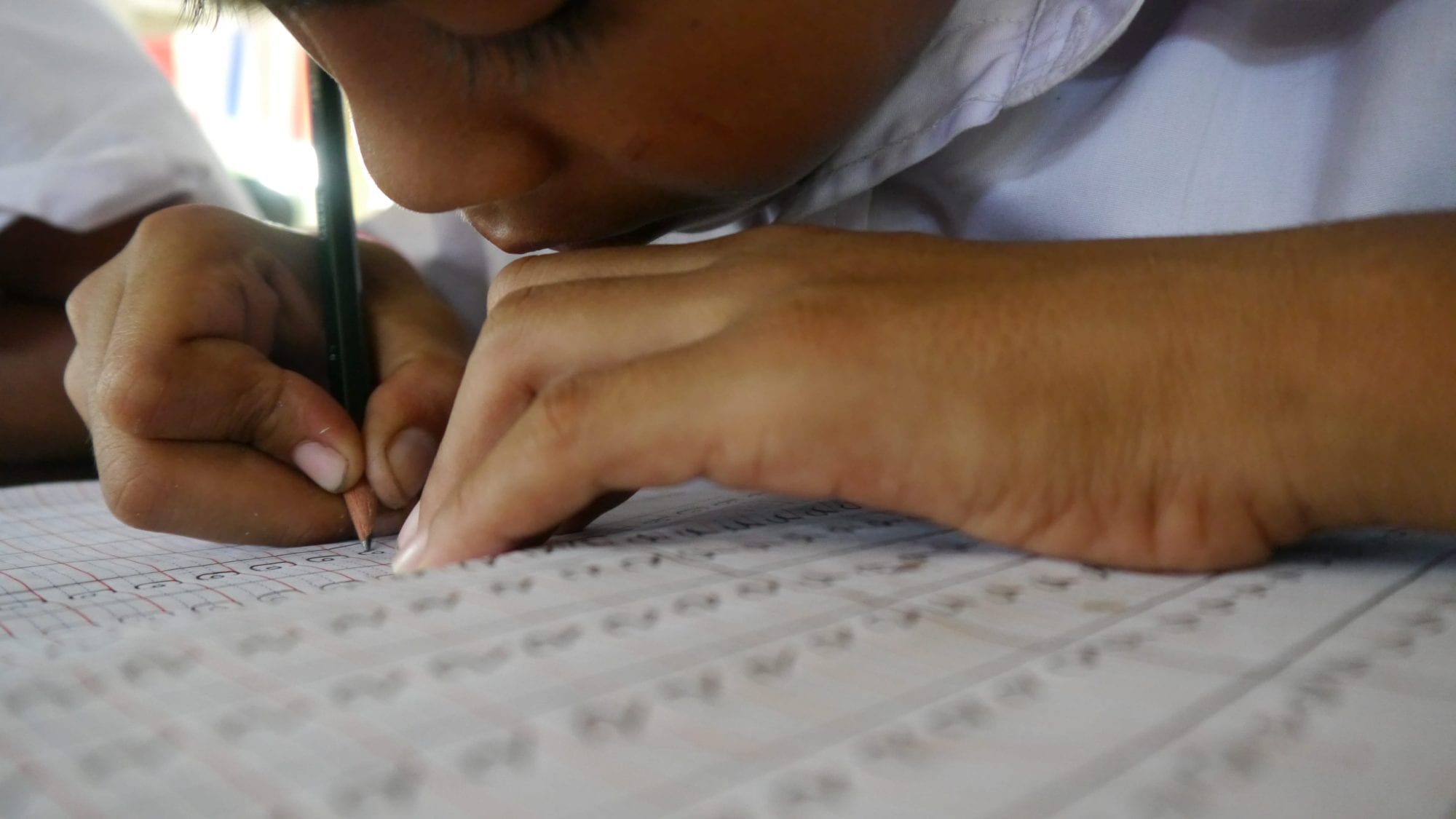
Aug 23, 2018
Two female migrant workers from Myanmar were arrested in Thailand, fined and await deportation for volunteering their time to teach children of migrant workers at a Buddhist monastery, an action the Thailand-based Human Rights and Development Foundation (HRDF) is calling “illegitimate and unjustified.”
The two women, who hold valid passports, visas and work permits, volunteered at the Laem Nok Monastery in southern Thailand in addition to the jobs for which they were hired. But immigration officials charged them with performing work without a permit to teach, even though the time they spend instructing the children is unpaid, according to HRDF and the Migrant Working Group (MWG). The MWG is a network of non-governmental organizations working on health, education and migrant workers’ rights that includes the Solidarity Center.
The arrests occurred despite the statement of one worker’s employer who told police the worker is lawfully employed and has been excused to take leave from her regular job painting boats because she is pregnant. The monastery also affirmed the two workers taught without pay, actions that are not illegal in Thailand, says HRDF, a Solidarity Center partner.
The women were forced to sign a document in Thai that they did not understand, in which they admitted they committed a crime, and received a fine of 5,000 Baht ($153) in lieu of imprisonment. They will be banned from re-entering to work in Thailand for two years, according to HRDF. A Myanmar national holding a tourist visa who observed the volunteers teaching was also arrested on the same charge.
“The arrests could signal a strong discouragement to other similar teaching programs in the country and could also pose a negative impact on education opportunities for migrant children as a whole,” HRDF and MWG said in a statement.
Volunteers Taught Children at Risk of Exploitation
The Laem Nok Monastery has operated a learning center for children of migrant workers for more than four years. The program began after the community recognized that migrant children, who are often left without care when their parents are working can be targets of forced labor, human trafficking and other forms of exploitation. With support from community fundraising, the monastery dedicated a learning space where children are taught the languages and cultures of Thailand as well as those of their origin countries. Local businesses provide funding for food and teaching supplies, but the teachers are unpaid volunteers, including local college students.
HRDF and MWG are calling on Thailand’s Department of Employment, Ministry of Labor to establish clear guidelines for enforcing compliance with work permits and to review the policy that restricts migrant workers from becoming paid or unpaid volunteers.
The groups also are urging police to ensure migrant workers’ legal rights are respected, including the right to legal counsel and to bail during pre-trial.
“The arrests have created undeserving traumas to the children in the classroom who had to witness their teachers being arrested and taken away in front of them,” says HRDF.
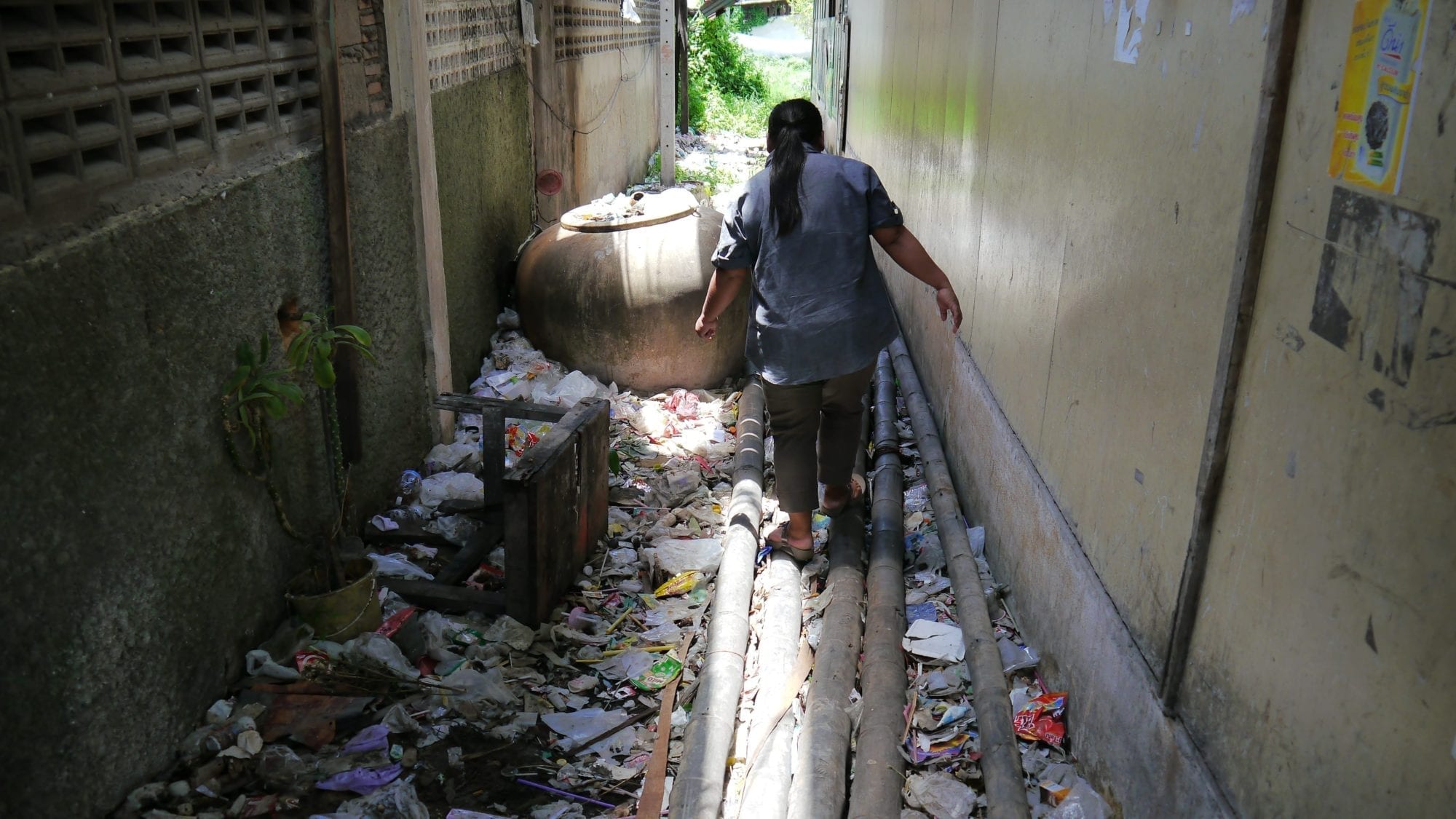
Jul 18, 2018
Worker rights advocates are hailing a recent court decision in Thailand that dismissed criminal defamation charges against 14 migrant workers from Myanmar who faced jail time after reporting abusive working conditions on a poultry farm.
Fourteen workers who left the farm in 2016 described forced overtime, unlawful salary deductions, confiscation of passports and restrictions on freedom of movement in a complaint to the National Human Rights Commission of Thailand.
In retaliation against the workers for submitting the complaint, the Thammakaset Co. Ltd. filed a criminal defamation complaint against the 14 workers, alleging they falsified claims to damage its business interests.
The case put a spotlight on abuse in the supply chain, says Solidarity Center Asia Regional Director Tim Ryan. The ruling “strikes a blow against the criminalization of promoting labor rights,” and is a landmark for migrant worker rights and freedom of expression.
“Companies filing criminal defamation complaints against workers who seek justice on the job is an all-too common practice, one often used as justification for dismissal. This decision is in line with international legal standards supporting free speech, freedom of assembly and other activities key to an open civil society.”
Workers Increasingly Migrate for Jobs
One of the migrant workers says he worked 22-hour shifts for more than four years at the Thammakaset 2 Poultry farm, which supplies one of Thailand’s largest chicken export companies. Myint told the Guardian that each day, he would kill up to 500 birds for food processing. At night, he and his co-workers say they slept on the floor in a room with up to 28,000 chickens, swatting away insects. If a bird got sick, they were to blame.
Of the 232 million migrants around the world, 150 million are migrant workers. Millions of migrant workers like Myint and his co-workers are unable to find family-supporting jobs in their origin countries. With labor migration increasing as men and women seek to support their families, the case highlights the rights of migrant workers seeking justice for workplace abuse.
A team of United Nations human rights experts this year called on Thailand to “end recurring attacks, harassment and intimidation of human rights defenders, union leaders and community representatives who speak out against business-related human rights abuse.”
Referring to the Thammakaset case, they said “business enterprises have a responsibility to avoid causing or contributing to adverse human rights impacts; therefore it is a worrying trend to see businesses file cases against human rights defenders for engaging in legitimate activities.”
Thammakaset also filed a criminal complaint against two of the 14 workers and a Migrant Worker Rights Network coordinator for the alleged “theft” of time cards, taken by the workers to show labor officials evidence of their claims about a 20-hour working day. MWRN, a Solidarity Center partner, is a membership-based organization for migrant workers from Myanmar working in Thailand.






